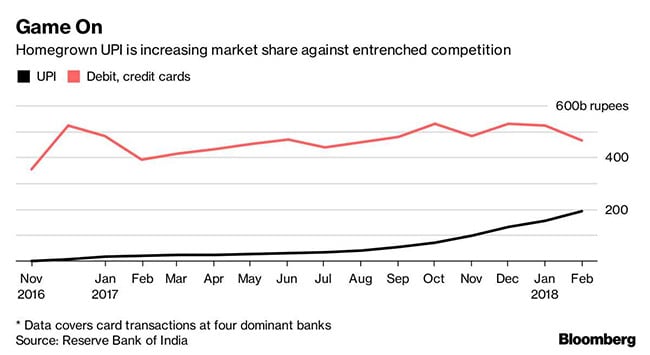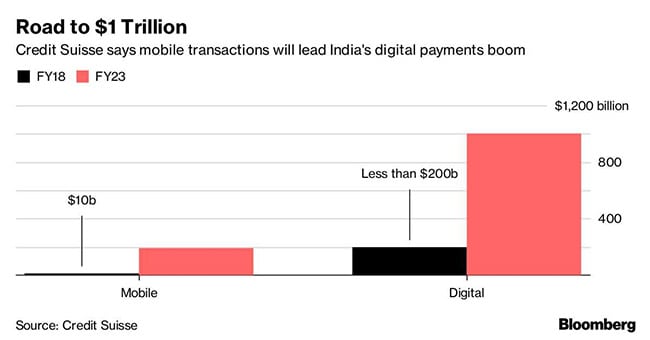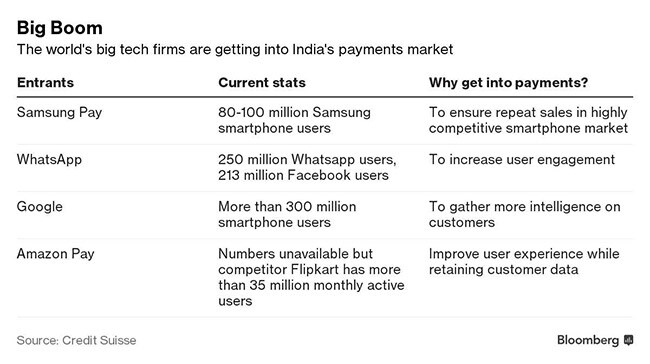
The dominance of cash is a challenge to India's digital payments platforms.
Global card companies like Visa Inc. and Mastercard Inc. are losing market share to upstarts in the world's most innovative payments market: India.
Transactions through India's homegrown Unified Payments Interface -- which allows mobile apps run by retailers, airlines and other firms to take payment directly from bank accounts -- reached almost half the value of debit and credit cards swiped at stores last month, central bank data show.
The surge in UPI transactions has taken place since 2016 when the interface was set up by an umbrella organization of Indian banks. Mastercard, in contrast, has built up its business in India over three decades.
 "The introduction of UPI in August 2016 led to the creation of a wealth of new innovative payment solutions, and the adoption rates of UPI payments are truly spectacular," U.S.-based Fidelity National Information Services Inc. said in a December 2017 report. UPI "opens up access to real-time by allowing payments to be directly integrated into external business applications," it said.
"The introduction of UPI in August 2016 led to the creation of a wealth of new innovative payment solutions, and the adoption rates of UPI payments are truly spectacular," U.S.-based Fidelity National Information Services Inc. said in a December 2017 report. UPI "opens up access to real-time by allowing payments to be directly integrated into external business applications," it said.
India's payments system was alone among more than 40 countries tracked by Fidelity National to gain a top score of five for innovation and customer value. China's Internet Banking Payment System scored two and Kenya's PesaLink scored four. Criteria included round-the-clock availability, speed of settlement, and level of government or regulator support.
Amazon.com Inc. and Jet Airways India Ltd. -- the nation's second-biggest airline by passengers -- are among firms that have integrated UPI into their apps in order to take payment from customers. Ola, a local rival to Uber Technologies Inc., Big Bazaar, a chain of stores run by billionaire Kishore Biyani, and incumbent mobile wallet leader Paytm Mobile Solutions Pvt. are other users.
 Facebook Inc. is piloting a payments service in India with a UPI backbone for its WhatsApp Pay, which has already drawn comparisons with the way WeChat reshaped payments in China.
Facebook Inc. is piloting a payments service in India with a UPI backbone for its WhatsApp Pay, which has already drawn comparisons with the way WeChat reshaped payments in China.
"Payment integration into popular apps in India will drive the digital payments market to $1 trillion over the next five years," Credit Suisse Group AG said in a report last month. "With 800 million bank accounts now linked, the bulk is mobile-transaction ready."
Currently, India's payments market is worth less than $200 billion, dwarfed by China's $27 trillion market that's now opening up to global players.
 One challenge in India is the dominance of cash, which accounts for some 70 percent of the country's total transactions by value. However, China transitioned to digital on the back of rising mobile and data penetration, and that process was hastened by e-commerce and social platforms, according to Credit Suisse. The same shift may play out in India, where data usage for 300 million Indian smartphone users rose to 5-10 GB a month from 1GB last year.
One challenge in India is the dominance of cash, which accounts for some 70 percent of the country's total transactions by value. However, China transitioned to digital on the back of rising mobile and data penetration, and that process was hastened by e-commerce and social platforms, according to Credit Suisse. The same shift may play out in India, where data usage for 300 million Indian smartphone users rose to 5-10 GB a month from 1GB last year.
Advances in India's digital payments market picked up pace after Prime Minister Narendra Modi's shock decision to invalidate 86 percent of the country's currency in circulation.
"While the effects of the demonetization event of November 2016 are now waning, it would be safe to conclude that the event has caused a permanent uplift in the share of non-cash transactions in the economy," said Credit Suisse.
Transactions through India's homegrown Unified Payments Interface -- which allows mobile apps run by retailers, airlines and other firms to take payment directly from bank accounts -- reached almost half the value of debit and credit cards swiped at stores last month, central bank data show.
The surge in UPI transactions has taken place since 2016 when the interface was set up by an umbrella organization of Indian banks. Mastercard, in contrast, has built up its business in India over three decades.

UPI transactions are on the rise in India compared to card transactions.
India's payments system was alone among more than 40 countries tracked by Fidelity National to gain a top score of five for innovation and customer value. China's Internet Banking Payment System scored two and Kenya's PesaLink scored four. Criteria included round-the-clock availability, speed of settlement, and level of government or regulator support.
Amazon.com Inc. and Jet Airways India Ltd. -- the nation's second-biggest airline by passengers -- are among firms that have integrated UPI into their apps in order to take payment from customers. Ola, a local rival to Uber Technologies Inc., Big Bazaar, a chain of stores run by billionaire Kishore Biyani, and incumbent mobile wallet leader Paytm Mobile Solutions Pvt. are other users.

India's digital payments market will be about $1 trillion by 2023.
"Payment integration into popular apps in India will drive the digital payments market to $1 trillion over the next five years," Credit Suisse Group AG said in a report last month. "With 800 million bank accounts now linked, the bulk is mobile-transaction ready."
Currently, India's payments market is worth less than $200 billion, dwarfed by China's $27 trillion market that's now opening up to global players.

The firms which are vying for India's digital payments space.
Advances in India's digital payments market picked up pace after Prime Minister Narendra Modi's shock decision to invalidate 86 percent of the country's currency in circulation.
"While the effects of the demonetization event of November 2016 are now waning, it would be safe to conclude that the event has caused a permanent uplift in the share of non-cash transactions in the economy," said Credit Suisse.
Track Latest News Live on NDTV.com and get news updates from India and around the world

